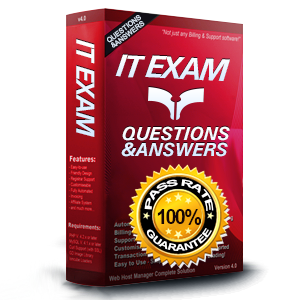
1Z0-148 Exam Questions & Answers
Exam Code: 1Z0-148
Exam Name: Oracle Database: Advanced PL/SQL
Updated: Apr 21, 2024
Q&As: 243
At Passcerty.com, we pride ourselves on the comprehensive nature of our 1Z0-148 exam dumps, designed meticulously to encompass all key topics and nuances you might encounter during the real examination. Regular updates are a cornerstone of our service, ensuring that our dedicated users always have their hands on the most recent and relevant Q&A dumps. Behind every meticulously curated question and answer lies the hard work of our seasoned team of experts, who bring years of experience and knowledge into crafting these premium materials. And while we are invested in offering top-notch content, we also believe in empowering our community. As a token of our commitment to your success, we're delighted to offer a substantial portion of our resources for free practice. We invite you to make the most of the following content, and wish you every success in your endeavors.

Download Free Oracle 1Z0-148 Demo
Experience Passcerty.com exam material in PDF version.
Simply submit your e-mail address below to get started with our PDF real exam demo of your Oracle 1Z0-148 exam.
![]() Instant download
Instant download
![]() Latest update demo according to real exam
Latest update demo according to real exam
* Our demo shows only a few questions from your selected exam for evaluating purposes
Free Oracle 1Z0-148 Dumps
Practice These Free Questions and Answers to Pass the Oracle Database Exam
Which statements are true about internal LOBs? (Choose all that apply.)
A. They cannot use redo logging.
B. They can be used as attributes of a user-defined data type.
C. They cannot be passed as parameters to PL/SQL subprograms.
D. They can be stored in a tablespace that is different from the tablespace that stores the table containing the LOB column.
Which three actions can be performed by using the DBMS_ASSERT package to prevent SQL injection? (Choose three.)
A. Detect a wrong user.
B. Check input string length.
C. Verify qualified SQL names.
D. Validate TNS connect strings.
E. Verify an existing schema name.
F. Enclose string literals within double quotation marks.
Which two are correct when migrating BasicFile LOBs to SecureFile LOBs by DBMS_REDEFINITION? (Choose two.)
A. Online redefinition can be done only at the table level.
B. Specify only BasicFiles LOB and SecureFiles LOB column names in parameter col_mapping of DBMS_REDEFINITION.START_REDEF_TABLE.
C. Set the database initialization parameter db_securefile to NEVER.
D. During migration, specify the NOLOGGING storage parameter for any new SecureFiles LOB columns.
E. Online redefinition is the recommended method for migration of BasicFile LOBs to Secure LOBs.
Examine this code:

The anonymous block fails with:
ERROR at line 1:
ORA-01403: no data found
ORA-06512: at line 5
Which two are valid options to prevent this error from occurring?
A. Line 5 should be replaced with: DBMS_LOB.CREATETEMPORARY (pdatabuf (1), TRUE, DBMS_LOB.CALL);
B. Line 5 should be replaced with: DBMS_LOB.CREATETEMPORARY (pdatabuf (1), FALSE, DBMS_LOB.SESSION);
C. Rewrite the block as: DECLARE TYPE databuf_arr IS TABLE OF CLOB INDEX BY BINATY_INTEGER; pdatabuf databuf_arr; PROCEDURE mytemplob (x OUT CLOB) IS BEGIN DBMS_LOB.CREATETEMPORARY (x, TRUE, DBMS_LOB.SESSION); END; BEGIN mytemplob (pdatabuf (1)); END; /
D. pdatabuf (1) := NULL; should be added after line 4.
E. Line 5 should be replaced with: DBMS_LOB.CREATETEMPORARY (pdatabuf, TRUE, DBMS_LOB.SESSION);
Examine these statements:
1.
A function with invoker's rights can be result cached by using both AUTHID CURRENT_USER and RESULT_CACHE in its declaration.
2.
A function with invoker's rights cannot be result cached because it may allow a user to retrieve data cached by another user.
3.
Results in the result cache for an invoker's rights function will be cached by the value of CURRENT_SCHEMA in the invoking environment.
4.
By default, declaring a function with RESULT_CACHE makes it an invoker's rights result cached function.
5.
A function with invoker's rights can be result cached because the function result cache is created per user for invoker's rights functions.
Identify the set of correct statements with respect to invoker's rights and function result caching.
A. 1, 3, 4 and 5
B. 1 and 3
C. 1, 3 and 5
D. 2 only
E. 1, 3 and 4
Viewing Page 1 of 3 pages. Download PDF or Software version with 243 questions

